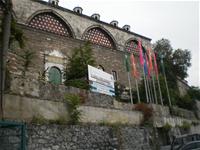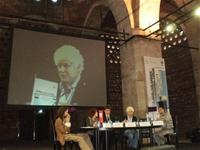About the borders of open society
Ralitsa Kovacheva, October 19, 2010
 On the edge between personal and social, between national and global, between domestic and foreign – there goes the thin red line of the borders of the open society. An oxymoron that quite well describes our contemporary reality. At a time, when we thought we were cosmopolitans, Europeans, Democrats, we found ourselves entangled in contradictions, searching for our identity.
On the edge between personal and social, between national and global, between domestic and foreign – there goes the thin red line of the borders of the open society. An oxymoron that quite well describes our contemporary reality. At a time, when we thought we were cosmopolitans, Europeans, Democrats, we found ourselves entangled in contradictions, searching for our identity.
How did this happen, I wonder, while listening to scientists, politicians and artists reflecting on the matter. They gathered together for the initiative "A Soul for Europe", this time - in the heart of Istanbul. The goal is rather to discuss cultural policies, but it soon becomes clear that the conversation about culture is an integral part of the great conversation about who we are and where our place is - in the world, in the time.
Things seem even more paradoxical, if observed from Bulgaria, because it is we, Bulgarians, who have a desperate need of a conversation about our identity and integration, which we stubbornly refuse to hold, we even refuse to start it. It is not easy to answer who we are and what our place in the world is, given that only 20 years since being a member of the Council for Mutual Economic Assistance and the Warsaw Pact we have became a member of the EU and NATO. What does this change mean for each of us and have we reached the end of its path? The first sign that we have not is precisely in the absence of a conversation about identity and integration, which so much agitates Europeans at the moment.
Globalisation has brought to people a sense of a loss - a loss of identity, of  security, a loss of the sense of belonging, a loss of confidence in the nation-state, Professor Paul Scheffer explains. This is the reason for the rise of populist and nationalist parties across Europe. Years ago in his essay "An Open Society Needs Borders" Professor Scheffer wrote: "These days citizens derive less legal security, social protection and cultural identity from the nation-state. There is a widening problem of sovereignty: many questions that concern everyday life seem beyond the grasp of national governments. Now that the cornerstones of our contented societies have started to wobble, many are turning away from the liberal government and open society."
security, a loss of the sense of belonging, a loss of confidence in the nation-state, Professor Paul Scheffer explains. This is the reason for the rise of populist and nationalist parties across Europe. Years ago in his essay "An Open Society Needs Borders" Professor Scheffer wrote: "These days citizens derive less legal security, social protection and cultural identity from the nation-state. There is a widening problem of sovereignty: many questions that concern everyday life seem beyond the grasp of national governments. Now that the cornerstones of our contented societies have started to wobble, many are turning away from the liberal government and open society."
According to Scheffer, people seek salvation in contemporary forms of tribalism and provincialism. We do not want globalisation, we do not want Europe, we do not want immigrants, people say. In a search of local identity, they tend to worship faces and behaviour that express it, even in defiance to the world. While explaining to me his understanding of provincialism, Professor Scheffer gave me an example of how it is manifested at the political level. Imagine a political leader, who is seemingly broad-minded, who is traveling, meeting with people; today he is in one corner of the world, tomorrow in another; he participates in prestigious forums, boasting how one sat beside him and another greeted him. At the same time, we talk about a narrow-minded person, who has not exceeded the mentality of a small man from a small village in terms of culture, education and views. Professor Scheffer was hardly aware of how well I understand his example, but I'm sure you will understand better.
This type of provincialism, however, may seem a temporary salvation for many people, but it is not a lasting solution to the problem of Europeans, who, while searching for their identity and integration, should realise a few things, Scheffer says. First, to recognise that one of the wedges in the wheel of modern nation-states, is immigration and its failed integration.
"The idea was that integration is purely a question of time, one generation succeeding the other, which has proven not to be true”, the professor writes in his essay. And further: "The problem of Islam and democracy will not solve itself with an attitude of wait and see." If we put back the conversation into Bulgarian reality, the integration of the nation state cannot happen without the integration of Roma. Likewise, the calls to bring back the borders will not help Western Europe, and building walls around the ghettos or pretending the problem does not exist will not help Bulgaria either. The recognition of the problem of integration should not lead to a closure but rather to reconsideration of some fundamental values from the both sides.
According to Paul Scheffer, cultural foundations of democracy lay in the inclusion, not exclusion - not just of immigrants or Roma, but of all of us, through shared citizenship. Citizenship, being understood as an active position, participation, commitment to society, part of which is everyone of us. "Stimulating citizenship constitutes an invitation to everyone to take a responsibility for our society."
Being a citizen is far more complicated than being a Bulgarian (or German, or Polish). Being a citizen requires making an effort to get educated, to be active. We, obviously, have been insufficiently prepared for this. But we still have time to make sure that future generations will be better citizens than us. What better cause than this for education, which especially in Bulgaria is still wandering in a search of its meaning: "Why do we offer religious education in our classrooms, but no structured education on the basis of our laws?", rhetorically asks Paul Scheffer. A question, which was raised also by few people in our country, but it remained unheard in the overall noise of the debates in favour or against religious education at school.
In this sense, provincialism, as described above, is not a solution. Shouting patriotic slogans and the closure of “the otherness” does not make us more adaptable, nor more prepared for the future. In this regard, Professor Scheffer sees the positive role Europe can play, “keeping together these attitudes of open mindedness and loyalty”: "European integration should be seen as a means to prevent the crisis in our democracies from deepening. It can only succeed if it is perceived as a protection or a means of 'survival' for the nation states that compose this Union."
Currently the attitude towards Europe, understood as the European Union, is just the opposite - giving more powers to Brussels means less sovereignty for the member states. This is because European integration has been realised institutionally, but not socially. European civil society does not exist yet, says Professor Ferenc Miszlivetz, director of the Institute for Social and European Studies Foundation in Hungary. "Europe does not have a soul", he says, playing with the name of the forum, “It might have a heart, but the soul is not here yet." The European reality is constructed by European politicians, without a substantial content, the Hungarian says and defines the Big Bang enlargement in 2004 as a failure for the EU. I wonder, how would he define the accession of Bulgaria and Romania.
But Professor Miszlivetz is also talking about education as a tool for dialogue and communication. In Europe we have a problem with translation, he says - we cannot express ourselves in the same language and we need translation, this is a problem. Because without a common language, in the broadest meaning of language, we cannot achieve dialogue, interaction and understanding. The European idea cannot be achieved without the active participation of the European citizens. And to become a European citizen, at first you must be a citizen of your own country, your own city, the neighbourhood you live in. "It's easy to be local and to be universal, but it is impossible to be universal without being local", Professor Scheffer says.
It's simple, if you think about it. If we do not litter the streets of our own city, it will be easy to do the same everywhere. If we care what happens in our children's school, maybe we will care what happens in China. The opposite, however, is impossible. We must still learn how to be citizens of our city, of our country, of Europe and of the world. And most of all, we must teach our children to that.
And with regard to the open society - it is threatened only by the boundaries of our minds. It depends on our ability to think freely and to stand by independent positions in our communication with others. Because free people are the only guarantors of a free society.